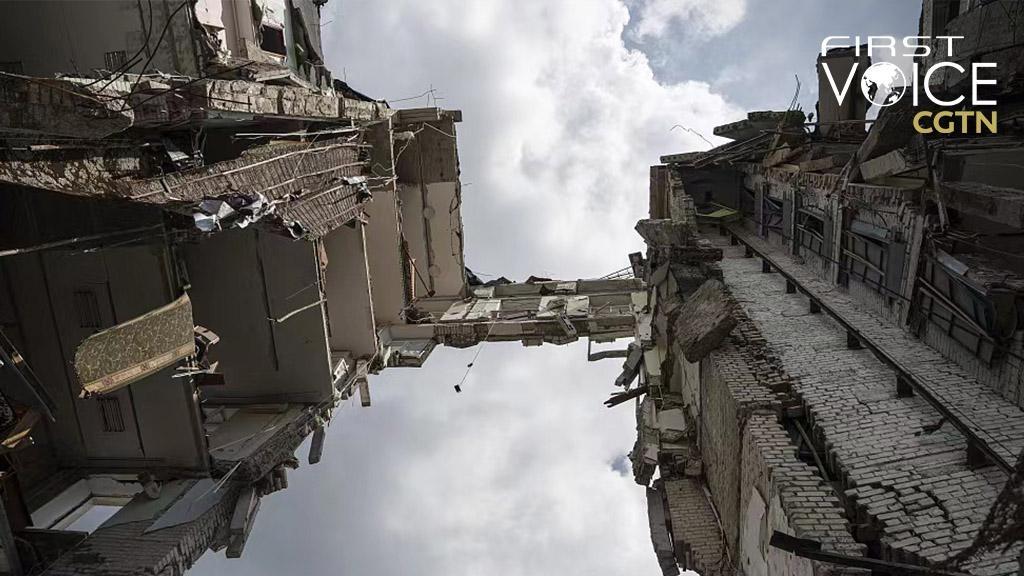
Editor's note: CGTN's First Voice provides instant commentary on breaking stories. The column clarifies emerging issues and better defines the news agenda, offering a Chinese perspective on the latest global events.
On February 21, China released the Global Security Initiative Concept Paper. It implores the world to remain committed to taking the legitimate security concern of all countries seriously and peacefully resolving differences and disputes between countries through dialogue and consultation. Accordingly, China supports the political settlement of hotspot issues such as the Ukraine crisis through dialogue and negotiation.
As the Ukraine crisis draws close to the one-year mark, various parties have responded differently to it. After meeting with senior Chinese diplomat Wang Yi in Munich, U.S. Secretary of State Antony Blinken threatened "serious consequences" for China if the country provides "lethal support" to Russia.
U.S. President Joe Biden made a 5-hour long surprise visit to Ukraine on February 20, pledging a $500 million military aid package to the country. Biden is expected to deliver a major speech on the Ukraine crisis on February 21 in Poland where, according to the Polish Prime Minister, he will discuss the possibility of increasing U.S. troop presence and making it more permanent.
Meanwhile, China has sought for a peaceful resolution. On the sidelines of this year's Munich Security Conference, Wang met with the Ukrainian Foreign Minister Dmytro Kuleba and said that China doesn't want to see the Ukraine crisis getting protracted and to escalate. He said that China and Ukraine are strategic partners and that the people of the two countries have enjoyed friendly exchanges for a long time.
And Wang had landed in Russia, visiting the country on the last leg of his European tour. The Ukraine crisis is expected to be on top of the agenda and Wang would promote peace talks in Ukraine, according to analysts.
The juxtaposition is striking: One side sending out arms and threats vs. the other trying to facilitate dialogues and tamp down tension. As the Concept Paper shown, today's security challenges are "complex and intertwined." Nothing exemplifies the complexity more than the Ukraine conflict, with Russia and Ukraine each fighting a battle for its own security interests. John Mearsheimer, political science professor at the University of Chicago, said in an interview in 2022 that Russian President Vladimir Putin drew the line in the sand in April, 2008 by saying that Ukraine joining NATO is a threat to Russia's survival.
"The legitimate and reasonable security concerns of all countries should be taken seriously and addressed properly, not persistently ignored or systemically challenged," said the Concept Paper. In a conflict with deeply-rooted and near-uncompromisable interests involved, trying to end it by securing a complete victory could only escalate tensions.
"What the Americans are dedicated to doing is blaming the Russians for the Ukraine war and making sure that nobody thinks the United States and its allies are responsible for that new Cold War," Professor Mearsheimer said in a recent interview with CGTN. Blaming one side and delivering weapons to the other don't facilitate the conflict resolution. Americans may say that they want the conflict to be over, but their ensuing actions have only prolonged it.
Insecurity and conflicts take place when the powerful think its way is the only and right way and disregard others' concerns. History has seen this cycle repeating itself over and over again. Today, looking to the future, the concept on how to achieve security must change.
China's position on the Ukraine conflict, and the vision for security expressed in the Global Security Initiative Concept Paper, stem from its recognition that peace can only be built and sustained when all countries truly respect each other's interests and seek resolution to differences through dialogue. As the paper stated that security is only sustainable when it's underpinned by morality, justice and the right ideas, force doesn't do the job. It might buy you one moment and a façade of feeling safe, but that won't last long.

 中文
中文



